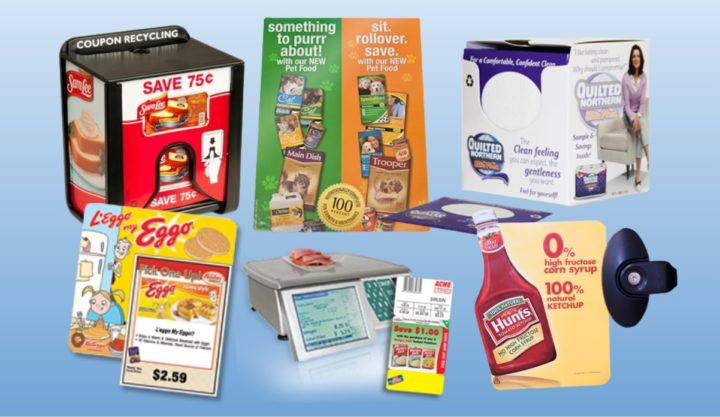
15 years and $500 million later, two of the biggest names in coupons are once again facing off in a federal courtroom. At stake in their latest dispute is the lucrative market of in-store coupons and ads that appear in tens of thousands of retail stores across the country.
Valassis publishes the Save coupon inserts, while News Corp. is the former owner of SmartSource publisher News America Marketing. But this dispute isn’t about coupon inserts. Valassis is finally getting its day in court, nearly eight years after filing suit against News America, accusing it of anticompetitive business practices that allowed it to maintain a monopoly on shelf displays, “blinkie” coupon dispensers, floor decals and other in-store promotions that you’re likely to see just about any time you shop in a store near you.
More than a decade ago, Valassis attempted to compete with News America by launching in-store promotions of its own. It offered brands and retailers an alternative version of News America’s shelf ads, coupon dispensers and floor graphics, along with its own unique promotions like on-shelf sample dispensers and coupons attached to weight-scale labels at the deli counter (as in the images seen above, which it used in its marketing material at the time).
But by 2013, Valassis gave up and exited the in-store promotions business, leaving it all to News America, after concluding that it couldn’t compete with the strong-arm tactics it says News America was using to keep retailers and manufacturers from switching to Valassis. So later that year, it took News America to court.
“Their whole monopolistic scheme was about preventing any competitor from coming in and getting access to enough retail stores,” Valassis attorney Michael Shuster told the jury during opening statements, as the trial got under way in New York yesterday.
Shuster said News America entered into long-term contracts with retailers and manufacturers, with staggered expiration dates, so some would expire one year, some the next, and some the next. The goal, he said, was to make it more difficult for a competitor to step in – Valassis contracted with a few retailers, including Supervalu, A&P, Winn-Dixie and Rite Aid, but “it wasn’t enough for Valassis to get to critical mass.” Most other retailers said they were already “tied up under exclusive contracts with News,” and without enough retailers in its network, Shuster said Valassis couldn’t get enough manufacturers interested in buying ads or offering coupons.
“These product manufacturers were also tied up in long-term contracts with News,” Shuster said. “So Valassis was getting squeezed from both sides.” In short, he told the jury, “when Valassis tried to start building its network, it ran into a brick wall,” so in 2013, “Valassis had to make the painful decision to exit the market and cut its losses.”
News America countered that Valassis’ lawsuit is just sour grapes. By its own admission, Valassis signed several retailers right out of the gate, News America attorney Ken Gallo told the jury. But when News America stepped up its game to compete against its new in-store advertising challenger, Valassis threw in the towel and blamed News America for its failure.
“Valassis is making excuses,” Gallo said. “No one stopped them or deterred them from entering (the market). They entered and they succeeded” – initially. But “News America responded by competing harder,” paying its retail customers more money for the right to place its ads in their stores. “There is nothing illegal about the retailer payments,” Gallo said. “This case is about business choices. Valassis chose not to invest in retailer contracts. NAM did.”
The current conflict grew out of a related legal dispute that dates all the way back to 2006. That’s when Valassis first sued News America, accusing it of using its dominant position in offering in-store promotions to pressure its manufacturer clients into offering coupons in the SmartSource Sunday coupon inserts instead of in Valassis’ inserts. News America eventually paid $500 million to settle that case.
But Valassis sued again in 2013, claiming that News America hadn’t changed its anticompetitive tactics even after the settlement. The judge in the case dismissed the insert-related claims two years ago, but allowed the dispute over the in-store ads to go to trial, which is where the two sides find themselves today.
A lot has changed since the two companies first squared off in court. Valassis came under new ownership shortly after suing for the second time, and News Corp. doesn’t even own News America Marketing anymore – it sold off the coupon-and-promotions business last year, but agreed to see the Valassis case through to the end.
Incidentally, Gallo argued, Valassis could have used that $500 million it got in the settlement with News America to invest in its efforts and better compete in the in-store promotions business. Instead, he said, “Valassis took $500 million out of the company in the form of stock buybacks and dividends, and they gave it to the shareholders.”
“Valassis committed substantial resources… over $100 million to the effort” to launch its in-store promotions business, Shuster countered. The company suffered millions of dollars a year in losses while trying to get the business off the ground, and eventually gave up because of News America’s “plan to exclude competition, a plan that targeted competitors.” Today, he said, only News America – and no one else – has the “exclusive right to place these ads in a nationwide network of retail stores – over 50,000 retail stores in the United States” – and if that’s not a monopoly, what is?
Valassis is seeking “an amount exceeding $200 million” from News America. Once both sides complete their arguments, in a case that’s expected to last for several weeks, it will be up to a jury to decide precisely how this long-running, costly dispute on how best to offer you coupons and promotions as you shop, finally comes to an end.













